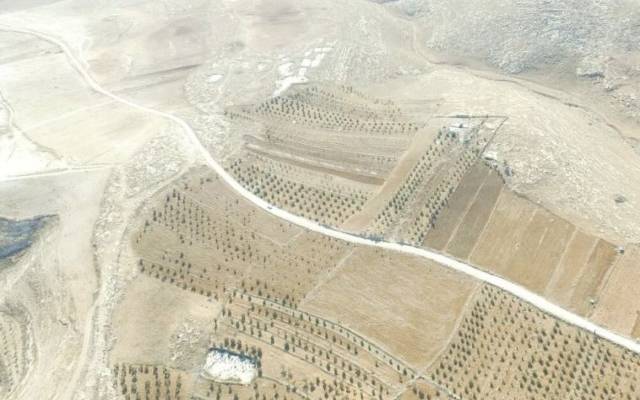The EU is working to undermine Israel’s presence in Judea and Samaria through the financing of illegal Palestinian construction projects.
A road outside Jerusalem has turned into a new battleground between Israel and the European Union (EU), deepening a dispute on Israel’s sovereignty in Judea and Samaria and the EU’s actions to undermine it.
The EU is financing the paving of a dirt road by Palestinians as part of what it says is a broader effort to help them develop the local economy on the way to eventual independence.
Israel, however, says the roadwork is illegal because it was done without Israeli permits and has ordered it to stop.
The dispute goes far beyond the 4-kilometer (2.5-mile) road, which Palestinians claim will help farmers in the area reach their land.
At issue, is the future of areas in Judea and Samaria known as “Area C,” the 60 percent of the territory that remained under full Israeli control as part of interim peace accords two decades ago. Its ultimate fate has been a major contention point in peace talks between Israel and the Palestinians.
Israel seeks to keep large chunks of the area, which is home to 400,000 Israelis. Israeli Education Minister Naftali Bennett and other Israeli leaders have called to annex the area.
According to interim peace accords, any construction in Area C requires permission from Israel.
The EU runs dozens of projects in Area C, many of them undermining Israeli control of the area and which are designed to grab land and create facts on the ground ahead of a possible final agreement. The Israeli government views these efforts with great suspicion and often demolishes illegal projects.
In a meeting with foreign journalists earlier this month, Israeli Prime Minister Benjamin Netanyahu called the EU-funded structures “illegal.”
“They’re building without authorization against the accepted rules and there’s a clear attempt to create political realities there,” Netanyahu said.
Israel has formally requested that the EU cease with their illegal actions.
Ari Briggs, of Regavim, a research-based legal advocacy NGO dedicated to ensuring accountable use of Israel’s national land, said his group objects to the construction on security grounds and fears that the Palestinians will expand their presence into Israeli areas. He accused the EU of “defying” Israeli law and establishing facts on the ground. “This is something that’s illegal,” he said.
The spat comes against the backdrop of a larger dispute over the Israeli presence in Judea and Samaria, which the EU is outright opposed to. The EU considers the Israeli communities illegal, claiming they undermine the goal of establishing a Palestinian state.
Last year, the EU passed a bill requiring goods produced in Judea and Samaria to have special labels if they are sold in Europe, thus singling them out for boycotts. Escalating the situation earlier this month, it said all agreements with Israel must “unequivocally and explicitly” show that they cannot apply to areas in Judea and Samaria, further underscoring its opposition to Israel’s presence there.
Ralph Tarraf, the EU representative to the Palestinian territories, said the 28-country bloc will carry on its actions in Area C, despite Israeli opposition.
“The EU provides humanitarian assistance to communities in need in Area C in accordance with the humanitarian imperative,” he claimed. “The EU also works with the Palestinian Authority to develop Area C and support the Palestinian presence there,” he said last week at a ceremony in the in the city of Ramallah. Tarraf declined an interview request.
With the battle showing no signs of abating, Netanyahu suggested that Israel and the EU “reset” their relationship on the issue.
He told reporters that he recently met with the EU’s foreign policy chief, Federica Mogherini, in Paris, and told her the sides need to get past their differences.
“I hope we can do this on better terms,” he said he told her. “We have to figure out a way to resolve this and set things on the right course.”
By: AP and United with Israel Staff
